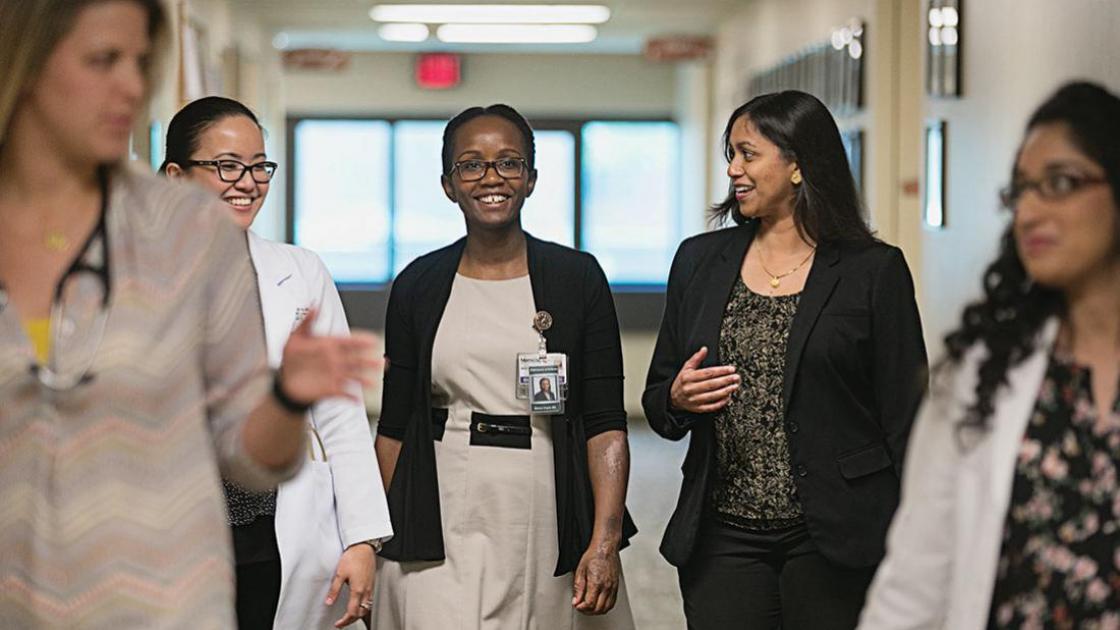
A Seat at the Table
In 1975, the first class graduated from the then just five-year-old SIU School of Medicine. To look at the class photo, two things stand out for those of us looking at it with a 2017 gaze: in this small class of 24 people, there is only one person of color, and not one is female.
The 1976 class, the charter class of the school, was significantly larger. The class of ’76 saw 43 graduates. Among those 43, there were no minorities, and just five women: Cris Anderson, MD, Brenda Baumann, MD, Regina Kovach, MD, Kathleen Link, MD, and Mary (Witges) Bengtson, MD. The charter women of SIU School of Medicine.
“I think we were very lucky. Most of the male colleagues in our class accepted us. They were great guys,” says Dr. Baumann. “Some of the older physicians were less accepting. It wasn’t overt; it was just a sense you got. You still had that generation where there weren’t many women who’d chosen medicine.”
“I grew up in a time when the way of the world was that men were in charge,” says Dr. Kovach. “As I got into clerkships and practice, people would assume I was a nurse, or a secretary. Sometimes, even a housekeeper. I don’t have the nature to be mad. They just didn’t know any better. They’d never seen a female doctor.” As a student, Dr. Kovach says she didn’t have the expectation of being discriminated against. “I thought that if I just worked hard, I’d get what I earned like anyone else. I can see now that gender discrimination is real, that women lacked opportunities. But things are a lot better now.”
Since those five women first graced the commencement stage, standing in that moment as equals to 38 male peers, things have improved. Of SIU School of Medicine’s 2,755 graduates, nearly 1,100 are women. According to the AAMC Missions Management Tool (2016), SIU School of Medicine ranks in the 85th percentile among all US medical schools in its percentage of full-time female faculty members.
Today, SIU Medicine has several female department chairs and associate deans: Janet Albers, MD, professor and chair of SIU School of Medicine’s Department of Family and Community Medicine; Karen Broquet, MD, MHPE, associate dean for graduate medical education; Wendy Cox-Largent, associate provost for finance and administration; Wendi El-Amin, MD, associate dean for diversity, equity and inclusion; Debra Klamen, MD, MHPE, senior associate dean for education and curriculum as well as professor and chair, Department of Medical Education; Christine Todd, MD, chair of medical humanities, as well as an accomplished writer and poet; Lori Williams, assistant provost of clinical and external affiliations; and Kari Wolf, MD, chair of the Department of Psychiatry. Linda Toth, PhD, retired in 2016 after 11 years as associate dean of research.
They’ve all forged their own paths to professional success, but the first to clear the way was Charlotte Campbell, PhD, SIU School of Medicine’s first professor of medical sciences, who joined the all-male founding faculty in 1973. Formerly a professor at Harvard, Dr. Campbell became the chair of the department, serving until her retirement in 1977.
“At SIU Medicine, we are recruiting the best and brightest to constantly elevate our faculty. Over the past decade, female faculty have emerged as leaders in all areas at SIU,” says Jerry Kruse, MD, MSPH, dean and provost of SIU School of Medicine. “Regardless of gender, they are doing outstanding work, maintaining and expanding our commitment to innovation.”
Women at SIU are not only serving in other administrative positions, long domineered by men, but they are receiving national honors for their work. Sue Hingle, MD, professor in the Department of Internal Medicine and director of faculty development, has been named chair of the American College of Physicians Board of Regents, one of just a handful of women to ever hold the position. Nina Antoniotti, RN, MBA, PhD, executive director of TeleHealth and Clinical Outreach, was recently appointed to the SnapMD clinical advisory board.
For many of these women, it can be challenging simply being one of the few at the top. Dr. Wolf knows all too well that she is unique in her role. “There are very few female chairs of psychiatry in medical schools across the country and many of us have faculties of mostly males that we’re managing,” she says. “Some men are respectful of that and some are not, so that’s something I’ve been attuned to.”
 This history of a limited number of female medical leaders can have lingering effects. “At conferences, when you look up at the stage and you’re in the audience, you see all these white men,” says Dr. Hingle. “And if you’re not a white man, it doesn’t even cross your mind that ‘that could be me.’ There’s an important need to feel included.”
This history of a limited number of female medical leaders can have lingering effects. “At conferences, when you look up at the stage and you’re in the audience, you see all these white men,” says Dr. Hingle. “And if you’re not a white man, it doesn’t even cross your mind that ‘that could be me.’ There’s an important need to feel included.”
Bias experienced by women in academic medicine doesn’t just come from male colleagues. When it comes to judgment and unfair criticism, often the proverbial call is coming from inside the house.
“I’ve had colleagues be told by other women that they need to prioritize,” Dr. Wolf says. “Certain comments, like ‘are you going to have a career in academics or are you going to be a mother?’ tend to come from other women—not men.”
In a time where the lack of women in science and other STEM fields is of national concern, even women at the top of these fields feel the struggle. “As a graduate student, we had to hold ourselves to higher standards. And you could never get mad,” says Shelley Tischkau, PhD, neuroendocrinologist and associate professor in the Department of Pharmacology. “If we wanted to be listened to in any argument, we had to do it in a very diplomatic way. Otherwise, you’re not seen as credible. You’re being ‘difficult.’ If I got angry, I couldn’t show it, or I’d be ignored. And that still happens to a certain extent.”
Other women in medicine faced different challenges. “As physician assistants, we may still face disparities because we are female, and additionally because we are not physicians,” explains Laurie Dunn-Ryznyk, MPAS, PA-C, associate professor, associate director, and one of the founders of the Physician Assistant Program at SIU School of Medicine’s Carbondale campus. According to the National Commission on Certification of Physician Assistants, 67 percent of physician assistants are women. “Very few people understand the rigor of PA medical education. There may be implicit bias against PAs as ‘less able’ than those who hold other degrees, but this seems to be changing nationwide. I find that we, as PAs, must be assertive in sharing our knowledge and in gaining a seat at the table.”
As such, for many female faculty members at SIU School of Medicine, the need to be empowering of their fellow women is all the more important.
“There are so many strong, smart, creative, innovative women here,” Dr. Albers says. “If I can support them by giving them opportunities and recognizing them, then I will. That’s what I decided when I became chair—encouraging and supporting and allowing our faculty to go out and make me proud. If I’ve done nothing else, I’ve hired good people.”
As an alumna and faculty member, Dr. Albers knows well the importance of equal seats at the table. Her graduating class of 1987 was the first SIU School of Medicine class to be 50-percent female. “Not to say I haven’t seen glass ceilings but I think we’re lucky at SIU,” Dr. Albers says. “We’re given good opportunities.”
For Vidhya Prakash, MD, SIU has been a place of gender inclusivity since she started in 2014. “Right away I felt a strong sense of community and support for all colleagues, whether you were male or female. I never really experienced gender bias here. I’ve never felt undervalued.”
All the women stress the importance of mentorship.
“I know I’ve had an easier journey because I’ve had wonderful female mentors,” says Careyana Brenham, MD, associate professor and residency program director for the Department of Family Medicine, who notes Dr. Albers as one of her strongest allies and sources of guidance. “It’s easier to go up the chain and become a female program director when you’ve had other female program directors.”
This can be especially true in the male-dominated field of science and research. “I think it’s extremely important to have female role models,” Dr. Tischkau says. “My experience with having women mentors is we tend to be more inclusive and nurturing—and maybe that’s my own gender bias—but that’s my experience so I try to bring this to my female students as well.”
For Dr. Prakash, one of her role models was Dr. Hingle. Together the two co-founded the Department of Internal Medicine’s Women in Medicine group.
Following a discussion with a resident struggling with balancing work and a new child, Dr. Prakash and Dr. Hingle, along with internal medicine residency director Andy Varney, MD, determined there needed to be a support group for female residents.
“Sue and I put our heads together, and I just decided to have an informal brunch in my home,” Dr. Prakash says of the group’s first meeting. “I invited female faculty as well as female residents and we all just sat down and had a great talk about expectations of women in general and especially of women who are working in terms of balancing work and life. It was a great conversation.”
Since then, the Women in Medicine group has flourished into a full organization with its own executive committee, including Sana Waqar, MD, Sharon Onguti, MD, Rexanne Caga-anan, MD, and a resident sub-committee. Women in Medicine has performed seminars on negotiation, hosted panels on gender bias and work-life balance and has also started a mentorship program. All the group’s projects are open to the whole department, not just women.
In addition to providing support for each other and SIU School of Medicine in general, the group provides support to the community. Some of the work they’ve done has included gift baskets and educational activities for children at the Mathew Project, arts and crafts activities and food for women and children at the Sojourn Shelter, food and meals for the Ronald McDonald House, sponsoring a paint night for the Illinois Coalition Against Domestic Violence and face painting for Girls on the Run. “Whatever we can do to help our community is extremely important to us,” Dr. Prakash says.
Together and apart, female doctors at SIU School of Medicine are rising to roles previously unavailable to them, to women in the medical field in general. For the physicians who are also mothers, they know how important this is for their children to see. “My boys are growing up seeing that a woman can be the breadwinner,” Dr. Hingle says.
And for those who’ve faced disparity, they take comfort and power in hope. “I am encouraged to see my colleagues included in more strategic planning, curriculum development, and grant procurement activities at SIU,” Dunn-Ryznyk says. “Academic and clinical medicine is not as male-dominated as it was years ago, and women are advancing in leadership roles at SIU, other universities and in health care organizations, as they should be. Academia can be a fierce place to work; however, these people, many of them women, have definitely contributed to my growth and to the success of our program. I have had some wonderful mentors here.”
“I don’t feel male domination at SIU. I think SIU does a good job of being conscious of women in leadership roles,” says Brandon Cox, PhD, assistant professor in pharmacology. “Maybe that’s because other women paved the way for us and my generation is now more able to stand up against it."
Thanks to their role models and the ones who came before, the younger generation of female doctors are ready and willing to stand for equity in their field. Since 2004, graduating classes at SIU School of Medicine have averaged 50-percent female.
“I know the politics out there. I know there are challenges. But I’ve never accepted that. It was never going to stop me from doing what I want to do,” Dr. Brenham says. “We have to acknowledge it. But I’ve never accepted it.”
Thanks to the women who came before them, more doors are opening. And there are far fewer ceilings.
This article was originally published in Aspects Magazine, Summer 2017 40-3.



